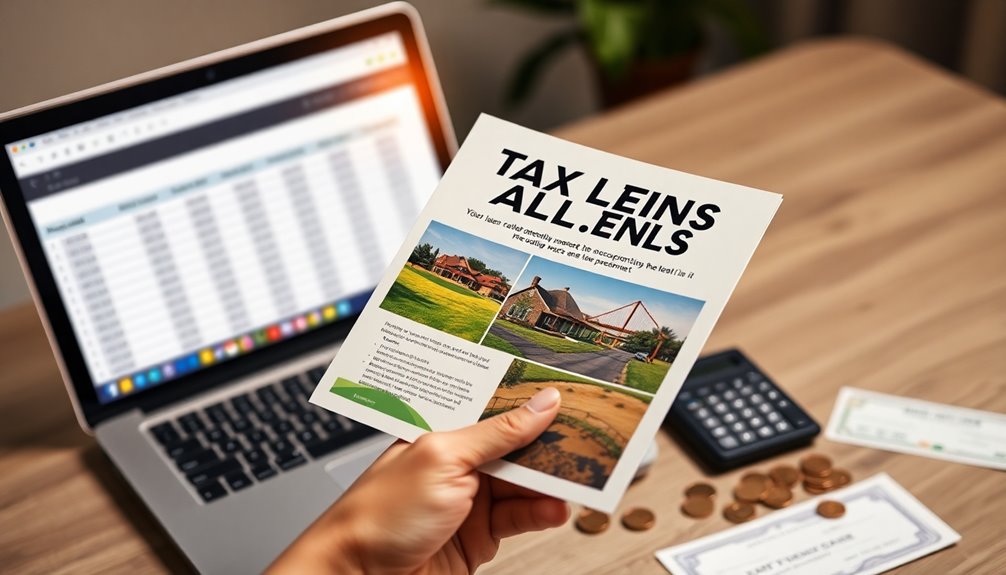To buy tax lien properties in Texas, start by researching available properties through your county's tax assessor's website or a tax sale database. Once you've identified properties, attend the auction, which requires prior registration. It's essential to inspect the conditions and assess their market value. Understand the bidding process, as you'll need certified funds for payment. Remember, properties are sold "AS IS," so do your due diligence. After the auction, be aware of the redemption period and the steps to secure ownership if the lien isn't redeemed. Curious about more detailed steps? You'll find plenty of helpful information ahead.
Key Takeaways
- Research properties through county tax assessor's websites to identify potential tax lien opportunities and understand existing liens and minimum bids.
- Complete the registration process with a valid ID and obtain a Bidder Card to participate in the auction.
- Attend the auction, place bids, and be prepared with immediate payment methods like ACH or credit cards if you win.
- Understand the redemption period, allowing previous owners to reclaim their property by paying delinquent taxes and fees before ownership transfers.
- After the redemption period, consider initiating a quiet title process for clear ownership and plan for any necessary property improvements.
Research and Preparation

Before diving into the world of tax lien properties, it's crucial to conduct thorough research and preparation to set yourself up for success. Start by identifying properties available for auction through your county tax assessor's website or the Tax Sale Resources database. Check the upcoming month's auction schedule and plan your auction day activities accordingly.
Next, look up local tax liens by searching Texas' online tax lien database or contacting the county tax collector. Gather detailed information about the properties up for auction, including minimum bids and lien amounts. Many Texas counties utilize online auction platforms, so familiarize yourself with those as well.
Don't skip property inspections; ensure the condition and potential value meet your expectations. Research the market value of the property and compare it to the delinquent tax lien amount. Be sure to check for other liens or encumbrances that could complicate ownership. Understanding the redemption periods is also essential, as Texas allows six months for non-homestead properties and two years for homestead properties to repay delinquent taxes.
Finally, analyze the risk by dividing the lien amount by the property's market value. This thorough groundwork will help you make informed decisions and maximize your investment potential.
Registration and Bidding

To successfully participate in tax lien auctions, you must complete the registration process ahead of time.
First, ensure you have a valid government-issued ID, as it's required for registration. Depending on your county, you might be able to register online, by mail, or in person on the day of the sale. If you choose to register online, visit the county's website to complete the process and receive email confirmation. Alternatively, you can print and mail the registration form.
Keep in mind that you'll need to sign a statement confirming you don't have any delinquent taxes on properties you own in the county. Additionally, be aware that a tax lien is a legal claim by the government on a property due to unpaid taxes, making it crucial to understand the implications of your purchase.
If you're representing someone else as a bidder agent, you must register separately and provide written proof of authorization.
Once registered, you'll receive a Bidder Card, which you must present at the auction.
Auction Process

The auction process for tax lien properties is straightforward but requires your full attention. Auctions are held by the county sheriff's office or tax office, typically on specific dates that vary by county. For instance, Hill County schedules auctions on dates like July 2 and October 1.
Make sure to check your county's official website for announcements and the exact time, often set for 10:00 AM at the county courthouse.
You'll find properties with delinquent taxes included in these auctions, which can range from residential to commercial, undeveloped land, or properties with improvements. Each property is sold "AS IS," so it's crucial to understand the location and condition beforehand.
Bidding usually happens through oral bids at a public auction, with online platforms also available for convenience. You'll need to start at the opening bid amount or higher, and be ready to pay immediately with cash or a cashier's check if you win. Additionally, it's important to note that the auction date for tax lien certificates is set annually, often falling between March and June, depending on local regulations.
If you're successful, you'll receive a tax lien certificate or a sheriff's deed. Remember, the deed comes without warranty and the redemption period begins, giving the original owner time to reclaim the property.
Financing and Payment

When considering how to finance your tax lien property purchases, it's essential to explore various options that can ease the burden of upfront costs. One effective avenue is property tax loans, which help you pay delinquent taxes without incurring the high interest and penalties from the county.
To secure a loan, contact a member of the Texas Property Tax Lenders Association (TPTLA), fill out an application, and structure a loan that fits your budget. Once approved, the loan company pays the taxes owed directly, initiating a manageable payment plan.
When you win an auction, prepare for the payment methods available. You might need to make a refundable registration deposit, but once you win, you'll have to pay the full amount of delinquent taxes, interest, and fees. Additionally, ensure you are aware that tax liens are typically sold at public auctions, which can lead to competitive bidding scenarios.
Accepted payment methods include ACH, debit/credit cards, and wire transfers, with some auctions even allowing online payments. Keep in mind the associated costs, such as auction fees and potential redemption fees, which can add up. Proper planning will ensure you're ready to navigate financing and payment effectively.
Due Diligence

Conducting due diligence is crucial before buying tax lien properties, as it helps you uncover vital information that could affect your investment.
Start by researching the property's condition and market value. Check for additional liens or encumbrances that may impact your purchase. Inspect the property to ensure it's not in poor condition or demolished. Using automated valuation models can assist in confirming its worth. Additionally, reviewing the title history can provide insights into past ownership and any potential issues.
Next, review the title commitment to identify the owner and legal description. Pay special attention to Schedule B for any exceptions and Schedule C to see existing liens. Conduct UCC lien searches and ensure all identified liens can be released at closing.
Obtain a detailed survey of the property to pinpoint improvements, easements, and zoning compliance. This will help you identify any encroachments and ensure the property meets local regulations.
Finally, check all government-issued documentation, including permits and code violations. Look for any ongoing litigation that could affect the property's future.
Post-Auction and Redemption

After winning a tax lien auction, you'll receive a redeemable deed, which allows the original property owner a designated period to reclaim their property. This period is six months for non-homestead properties and two years for homesteads. During this time, the original owner can redeem the property by paying back taxes, penalties, interest, and any amounts you paid at the auction. It's important to note that Texas law allows homeowners to reclaim properties during this period, which can significantly impact your investment strategy.
You'll have some property rights during the redemption period, but remember, you won't be reimbursed for any improvements you make. Once the auction is complete, the original owner will be notified, starting their redemption clock. If they fail to redeem the property within the specified timeframe, you'll gain full ownership.
When it comes to redemption payments, ensure they include all delinquent taxes and associated costs. These payments must be made in certified funds.
If the property isn't redeemed, you'll need to go through a quiet title process to secure an insurable title. Be prepared for potential eviction if the former owner refuses to vacate.
Once the redemption period ends, you can make any improvements to the property as the new owner.
Frequently Asked Questions
What Are the Risks of Investing in Tax Lien Properties?
Investing in tax lien properties carries several risks you should be aware of.
Properties might be in poor condition, affecting their value, and environmental issues can make them worthless.
Foreclosure processes can be lengthy and costly, sometimes leading to losses.
Economic downturns can reduce property values, while title issues may incur extra costs.
You also face liquidity risks, as these investments can be hard to convert back into cash quickly.
How Do I Find Tax Lien Properties in My Area?
To find tax lien properties in your area, start by visiting your county's official website or appraisal district site.
Use their search tools to locate properties with outstanding taxes. Look for downloadable files listing delinquent properties and check auction dates with the county treasurer's office.
Don't forget to contact local authorities for additional information and explore online platforms that feature county-specific tax lien sales.
This'll give you a solid starting point!
Can I Lose Money on a Tax Lien Investment?
Yes, you can lose money on a tax lien investment. If property owners default, the foreclosure process can be lengthy and costly, often consuming your potential profits.
You might also face unexpected property conditions or declining market values that reduce your returns.
Plus, competitive bidding can drive up lien prices, making it easy to overpay.
It's crucial to thoroughly research and understand the legal landscape to mitigate these risks.
Are Tax Lien Properties Suitable for First-Time Investors?
Tax lien properties can be suitable for first-time investors, but they come with significant risks.
You'll need to do thorough research and understand local laws. While the potential for high returns exists, you might face competition from experienced investors.
It's essential to set a clear budget and be prepared for the complexities of the foreclosure process.
If you're willing to educate yourself and manage risks, tax lien investments could be a rewarding venture.
What Happens if the Property Owner Pays Their Taxes?
If the property owner pays their taxes during the redemption period, they clear the tax lien and retain ownership of the property.
You'll receive back your investment along with the accrued interest, typically between 10% and 12%.
Once they make the payment, your role ends, and the property is free from the lien, restoring its full value.
It's common for owners to repay early to avoid losing their property.
Conclusion
Buying tax lien properties in Texas can be a rewarding investment if you follow the right steps. By researching thoroughly, registering for auctions, and understanding the bidding process, you can position yourself for success. Don't forget to conduct due diligence and be prepared for financing options. Once you've secured your property, stay informed about redemption periods. With careful planning and execution, you'll navigate the tax lien landscape and potentially reap significant rewards. Happy investing!









